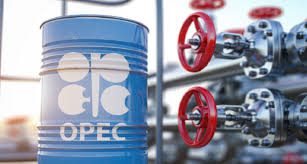Lagos, Nigeria – As of September 5, 2025, Nigerian crude oil prices have held steady above $71 per barrel, reflecting a delicate balance in global oil markets amid anticipation of the upcoming decision by the Organization of the Petroleum Exporting Countries (OPEC). The resilience of Nigeria’s flagship crude grades, such as Bonny Light and Qua Iboe, comes despite ongoing volatility in global energy markets, driven by geopolitical tensions, supply constraints, and shifting demand patterns. As the world’s eyes turn to OPEC’s next meeting, Nigeria’s oil sector remains a critical player in the global energy landscape, with significant implications for the country’s economy and the broader market.
The stability of Nigerian crude prices above $71 per barrel offers a glimmer of hope for Africa’s largest oil producer, which has faced persistent challenges in its oil sector, including production disruptions, infrastructure deficits, and regulatory uncertainties. However, the market’s focus on OPEC’s impending decision underscores the complex interplay of global supply dynamics, economic policies, and geopolitical factors that continue to shape Nigeria’s oil industry. This article explores the factors behind the current price stability, the role of OPEC in influencing global oil markets, and the broader implications for Nigeria’s economy and energy sector.
Nigeria’s Oil Sector: A Pillar of the Economy
Nigeria, often referred to as the “Giant of Africa,” is the continent’s largest oil producer and one of the world’s top exporters of crude oil. With proven reserves of approximately 37 billion barrels, the country’s oil sector accounts for about 70% of government revenue and over 90% of foreign exchange earnings. Key crude grades like Bonny Light, Qua Iboe, and Brass River are highly sought after in international markets due to their low sulfur content, making them ideal for refining into gasoline and other products.
Despite its vast resources, Nigeria’s oil sector has faced significant challenges in recent years. Production has been hampered by pipeline vandalism, oil theft, and underinvestment in infrastructure, leading to output levels well below the country’s potential. In 2024, Nigeria’s average daily production was approximately 1.3 million barrels per day (bpd), significantly lower than its OPEC quota of 1.5 million bpd. These disruptions have strained government finances, exacerbated by the country’s reliance on oil revenue to fund its budget.
The administration of President Bola Ahmed Tinubu has prioritized revitalizing the oil sector as part of its economic reform agenda. Key initiatives include the passage of the Petroleum Industry Act (PIA) in 2021, which aims to improve transparency, attract investment, and streamline operations in the sector. The government has also sought to address oil theft and pipeline vandalism through increased security measures and partnerships with local communities. These efforts have contributed to a modest recovery in production, with output rising to 1.45 million bpd in mid-2025, according to data from the Nigerian National Petroleum Company Limited (NNPCL).
The stability of Nigerian crude prices above $71 per barrel is a positive development for the government, which has faced fiscal pressures due to high inflation, a depreciating naira, and rising public debt. Higher oil prices provide a much-needed boost to government revenue, enabling investments in critical sectors such as infrastructure, healthcare, and education. However, the market’s reliance on OPEC’s decisions highlights the external factors that continue to shape Nigeria’s economic fortunes.
Global Oil Market Dynamics
The global oil market in 2025 is characterized by a delicate balance of supply and demand, influenced by geopolitical events, economic recovery, and the ongoing transition to renewable energy. Brent crude, the global benchmark, has hovered around $70-$75 per barrel in recent months, reflecting a combination of supply constraints and cautious demand growth. Key factors driving the market include:
Geopolitical Tensions: Conflicts in the Middle East, particularly the ongoing Israeli-Palestinian conflict and tensions between Iran and its regional rivals, have raised concerns about potential disruptions to oil supplies. While these conflicts have not directly impacted major oil-producing regions, they have contributed to market uncertainty, supporting higher prices.
OPEC+ Production Policies: The OPEC+ alliance, which includes OPEC members and non-members like Russia, has played a central role in managing global oil supply. In response to price volatility, OPEC+ has maintained production cuts of approximately 5.8 million bpd since 2022, with some cuts extended into 2025. These measures have helped stabilize prices by preventing an oversupply in the market.
Demand Recovery: Global oil demand has shown signs of recovery following the economic slowdown caused by the COVID-19 pandemic. However, demand growth has been uneven, with strong recovery in Asia, particularly China and India, offset by slower growth in Europe and North America, where energy transitions are accelerating.
Energy Transition Pressures: The global push toward renewable energy and decarbonization has introduced long-term uncertainties for oil markets. Major economies, including the European Union and the United States, have set ambitious targets for reducing carbon emissions, prompting investments in electric vehicles, solar, and wind energy. While oil remains a critical energy source, these trends are reshaping demand forecasts.
Nigerian crude, known for its light, sweet quality, has benefited from strong demand in Asia, particularly from India, which has emerged as a key buyer. The stability of prices above $71 per barrel reflects this demand, as well as Nigeria’s efforts to improve production and address supply chain disruptions. However, the market’s anticipation of OPEC’s next decision underscores the country’s vulnerability to external factors.
OPEC’s Role and the Upcoming Decision
OPEC, founded in 1960, is a cartel of 13 oil-producing nations, including Nigeria, that collectively controls about 40% of global oil supply. The organization’s primary objective is to coordinate production policies to stabilize prices and ensure a steady income for member countries. In recent years, OPEC has worked closely with non-members like Russia through the OPEC+ alliance to manage supply in response to market fluctuations.
The upcoming OPEC meeting, expected to take place in late September 2025, is a focal point for global oil markets. Analysts are divided on whether the organization will extend its current production cuts, increase output to capture higher prices, or adjust its strategy in response to demand forecasts. Several factors will influence OPEC’s decision:
Global Demand Outlook: The International Energy Agency (IEA) projects global oil demand to grow by 1.2 million bpd in 2025, driven by economic recovery in Asia. However, uncertainties around China’s economic performance and the pace of the energy transition could temper this growth.
U.S. Shale Production: The United States, the world’s largest oil producer, has increased shale oil output in recent years, adding to global supply. OPEC’s decision will likely consider the potential for U.S. production to offset any cuts.
Geopolitical Risks: Ongoing conflicts in the Middle East and tensions between major powers, such as the U.S. and China, could influence OPEC’s strategy. A disruption in supply from a key producer, such as Iran or Saudi Arabia, could prompt the organization to adjust its quotas.
For Nigeria, OPEC’s decision is critical. The country has struggled to meet its production quota due to domestic challenges, and any decision to maintain or deepen cuts could limit its ability to capitalize on higher prices. Conversely, an increase in output could lead to oversupply and downward pressure on prices, undermining Nigeria’s revenue gains.
Implications for Nigeria’s Economy
The stability of Nigerian crude prices above $71 per barrel offers significant opportunities for the country’s economy. Higher oil revenues provide fiscal space to address pressing needs, such as infrastructure development, social welfare programs, and debt servicing. Nigeria’s public debt, estimated at $110 billion as of mid-2025, has been a growing concern, with debt service costs consuming a significant portion of the budget. Higher oil prices could ease this burden, allowing the government to invest in long-term development projects.
However, the reliance on oil revenue underscores the need for economic diversification. The Tinubu administration has emphasized non-oil sectors, such as agriculture, manufacturing, and technology, as part of its diversification strategy. Initiatives like the Federal Inland Revenue Service’s (FIRS) e-invoicing rollout, in partnership with companies like eTranzact, aim to boost non-oil revenue through improved tax compliance. Despite these efforts, oil remains the backbone of the economy, and fluctuations in global prices continue to have a disproportionate impact.
The stability of crude prices also has implications for Nigeria’s foreign exchange market. The naira has faced significant depreciation in recent years, trading at over 1,600 to the dollar in mid-2025. Higher oil revenues could strengthen the Central Bank of Nigeria’s (CBN) ability to stabilize the currency, reducing inflationary pressures and improving purchasing power for consumers.
Challenges in Nigeria’s Oil Sector
Despite the positive outlook for crude prices, Nigeria’s oil sector faces several challenges that could undermine its ability to capitalize on market conditions. These include:
Oil Theft and Pipeline Vandalism: Illegal bunkering and pipeline vandalism have cost Nigeria billions of dollars in lost revenue. The government has deployed security forces and technology, such as drones, to combat these issues, but progress has been slow.
Underinvestment: Decades of underinvestment in oil infrastructure have led to aging pipelines, refineries, and production facilities. The PIA aims to attract foreign investment, but regulatory uncertainties and security concerns have deterred some investors.
Global Energy Transition: The shift toward renewable energy poses a long-term threat to Nigeria’s oil-dependent economy. As major markets reduce their reliance on fossil fuels, demand for Nigerian crude could decline, necessitating a rapid pivot to alternative revenue sources.
OPEC Quota Compliance: Nigeria’s inability to meet its OPEC quota due to production constraints has limited its market share. Addressing these constraints will require significant investment and policy reforms.
The government’s efforts to address these challenges include partnerships with private sector players, such as international oil companies (IOCs) like Shell and Chevron, and initiatives to improve transparency in the sector. The NNPCL has also launched programs to rehabilitate refineries, such as the Port Harcourt and Dangote refineries, to reduce Nigeria’s reliance on imported petroleum products.
Global and Regional Perspectives
The stability of Nigerian crude prices must be viewed within the broader context of global and regional energy dynamics. In Africa, Nigeria competes with countries like Angola, Algeria, and Libya for market share. Angola, another major OPEC producer, has also benefited from stable prices, but its production has been constrained by similar challenges, including underinvestment and aging infrastructure.
Globally, the oil market is influenced by the actions of major producers like Saudi Arabia, Russia, and the United States. Saudi Arabia, OPEC’s de facto leader, has advocated for maintaining production cuts to support prices, while Russia has sought to balance its own fiscal needs with market stability. The U.S., with its growing shale oil production, remains a wildcard, as its output could offset OPEC’s efforts to control supply.
The energy transition also looms large. The European Union’s push for net-zero emissions by 2050 and China’s investments in renewable energy could reduce long-term demand for oil, impacting producers like Nigeria. However, in the short term, oil remains a critical energy source, particularly for developing economies in Asia, which continue to drive demand growth.
Stakeholder Reactions
The stability of Nigerian crude prices has been welcomed by industry stakeholders. The Nigerian National Petroleum Company Limited described the price level as “encouraging,” noting that it supports the government’s fiscal objectives. Oil traders and analysts have also expressed cautious optimism, citing Nigeria’s efforts to boost production and address security challenges.
However, some stakeholders have warned against complacency. The Petroleum and Natural Gas Senior Staff Association of Nigeria (PENGASSAN) called for increased investment in the sector to sustain production gains. “While stable prices are positive, we must address the root causes of low output to fully benefit,” said PENGASSAN President, Festus Osifo.
Analysts on platforms like X have highlighted the broader implications of OPEC’s decision for Nigeria. One user noted, “OPEC’s next move will determine whether Nigeria can sustain this price stability or face another downturn.” The sentiment reflects the uncertainty surrounding global oil markets and Nigeria’s position within them.
Conclusion
The stability of Nigerian crude prices above $71 per barrel is a positive development for the country’s economy, offering a lifeline amid fiscal challenges and global uncertainties. As the market awaits OPEC’s next decision, Nigeria’s ability to capitalize on this stability will depend on its success in addressing domestic challenges, such as oil theft, underinvestment, and production constraints. The government’s reform efforts, including the PIA and partnerships with the private sector, provide a foundation for progress, but sustained commitment is needed to ensure long-term success.
The broader implications of stable oil prices extend beyond Nigeria, influencing global energy markets, regional competition, and the ongoing energy transition. As OPEC prepares to make its next move, Nigeria must navigate a complex landscape of opportunities and risks to secure its position as a leading oil producer. By balancing short-term gains with long-term diversification, Nigeria can leverage its oil wealth to build a more resilient and prosperous economy.






